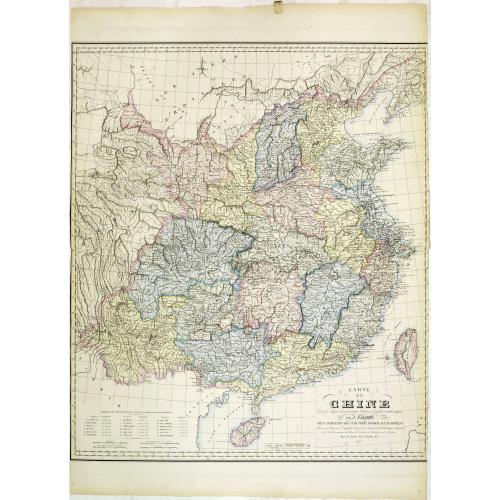Lot #: 31399
Carte de la Chine dressée d'après les matériaux Chinois les plus authentiques par J. Klaproth avec l'indication des cinq ports ouverts aux Européens. . . |
||||||||||||||||||||
|
||||||||||||||||||||
|
|
||||||||||||||||||||
|
Selling price: $1200
Sold Join our News Letter to get informed when a similar item comes available. Do you have an example you would like to sell? |
Views: 139
|
|||||||||||||||||||
Description
Detailed map of China east of Tibet and including the islands of Tonkin and Taiwan. According to the title the map indicated the five ports open to the European traders according to the Treaty of Nanjing. These five ports, Canton, Shanghai, Ning-pho, Fou-Tcheou, Amoy, Hong Kong and Macao are mentioned in the lower part and underlined in red.
To the left a numbered key (1 - 18) to the different provinces.
Treaty of Nanjing, (Aug. 29, 1842) treaty that ended the first Opium War, the first of the unequal treaties between China and foreign imperialist powers. China paid the British an indemnity, ceded the territory of Hong Kong, and agreed to establish a “fair and reasonable” tariff. British merchants, who had previously been allowed to trade only at Guangzhou (Canton), were now permitted to trade at five “treaty ports” and with whomever they pleased.
Julius Klaproth (1783-1835) devoted his energies in quite early life to the study of Asiatic languages, and published in 1802 his Asiatisches Magazin (Weimar, 1802–1803).
He was in consequence called to St. Petersburg and given an appointment in the academy there. In 1805 he was a member of Count Golovkin's embassy to China.
On his return he was despatched by the academy to the Caucasus on an ethnographical and linguistic exploration (1807–1808), and was afterwards employed for several years in connection with the academy's Oriental publications. In 1812 he moved to Berlin.
In 1815 he settled in Paris, and in 1816 Humboldt procured him from the king of Prussia the title and salary of professor of Asiatic languages and literature, with permission to remain in Paris as long as was requisite for the publication of his works.
He died in Paris on 28 August 1835.
Klaproth was an orientalist or an "Asiatologist," in that he had a good command not only of Chinese, but also Manchu, Mongolian, Sanskrit, Turkish, Arabic, Persian, and even Caucasian languages. His wide range of interests encompassed the study of the development of individual countries in their Asian context. (source Wikipedia)
To the left a numbered key (1 - 18) to the different provinces.
Treaty of Nanjing, (Aug. 29, 1842) treaty that ended the first Opium War, the first of the unequal treaties between China and foreign imperialist powers. China paid the British an indemnity, ceded the territory of Hong Kong, and agreed to establish a “fair and reasonable” tariff. British merchants, who had previously been allowed to trade only at Guangzhou (Canton), were now permitted to trade at five “treaty ports” and with whomever they pleased.
Julius Klaproth (1783-1835) devoted his energies in quite early life to the study of Asiatic languages, and published in 1802 his Asiatisches Magazin (Weimar, 1802–1803).
He was in consequence called to St. Petersburg and given an appointment in the academy there. In 1805 he was a member of Count Golovkin's embassy to China.
On his return he was despatched by the academy to the Caucasus on an ethnographical and linguistic exploration (1807–1808), and was afterwards employed for several years in connection with the academy's Oriental publications. In 1812 he moved to Berlin.
In 1815 he settled in Paris, and in 1816 Humboldt procured him from the king of Prussia the title and salary of professor of Asiatic languages and literature, with permission to remain in Paris as long as was requisite for the publication of his works.
He died in Paris on 28 August 1835.
Klaproth was an orientalist or an "Asiatologist," in that he had a good command not only of Chinese, but also Manchu, Mongolian, Sanskrit, Turkish, Arabic, Persian, and even Caucasian languages. His wide range of interests encompassed the study of the development of individual countries in their Asian context. (source Wikipedia)
FAQ - Guarantee - Shipping
In our BUY-or-BID sale, you never pay more than the Buy price.
To buy or bid in this Buy-or-Bid sale you must register with us. It is free, and we automatically update you about future auctions.During the Buy-or-Bid sale, you can buy or bid on 600- 900 antique, rare maps, town views, old master prints, decorative prints, atlases, posters and Medieval manuscripts.
- We show the "Bid & Ask spread" (to define the gap between the minimum accepted bid and Buy price.)
- Items that have received bids within the BidAsk spread are sold at the highest bid at closing.
- Once the Buy price is paid, the sale for this item has closed.
Do you have a similar item you want to sell ?
Interested in selling your antique maps, original prints, vintage posters, or historic Ephemera?Let us help you!
Start your consignment today. We provide estimates free of charge from photographs sent via the Internet. Fill out our online estimation form, and we will contact you with an estimate.
Learn more about consigning at RarePaperSales.com
Guarantee
 We warranty the authenticity of each lot offered in our sale. There is no time limitation to this guarantee.
We warranty the authenticity of each lot offered in our sale. There is no time limitation to this guarantee.- Defects in lots have been carefully noted.
- If there are no remarks regarding splits, tears, discoloration, etc., there are no issues to be found for the item!
- All items are carefully and personally examined before being packed "in-house" and shipped by UPS, USPS, DHL or registered mail.
- We do not sell reproductions.
- A certificate of authenticity is provided for each acquired item and can be downloaded from your invoice page.
- Certificates can be found in the Invoice and Certificates center.
Shipping
Maps are shipped in solid tubes or flat between solid cardboard. Fully insured, signature required, and with online tracking. Shortly after shipment, you will get the tracking number by email.The standard is that we ship items by UPS or DHL for European destinations, and a flat shipping fee is added to each shipment. It is a one-time fee even if you buy multiple items. This fee covers shipping and insurance (up to the invoice amount) to:
- North America, Canada, Europe $ 30
- Asia $ 40
- For South America, Mauritius, Africa and Australia a shipping fee of $ 50 will be charged.
We charge only a one-time shipping fee if you have won 2 or more items.

Hold Shipment Service
Rare Paper Sales allows you to put your shipping on hold at no additional charge. This can be incredibly convenient for people who want to buy several items at different auctions and ship them together. The service is free, and you pay only one shipment fee.
Contact us if you want to use the Hold Service.
High-Resolution Digital Image Download |
|
|
RarePaperSales maintains an archive of most of our high-resolution rare maps, prints, posters and medieval manuscript scans. We make them freely available for download and study. Read more about free image download |
